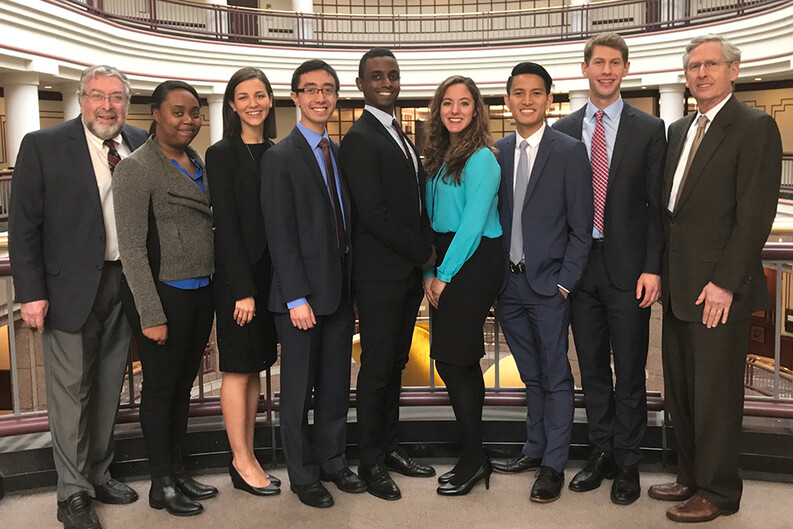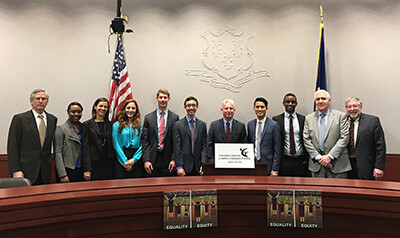Clinic Students Advocate for Education Adequacy Cost Study

Students from Yale Law School’s Education Adequacy Project (EAP) testified at a Connecticut Education Committee public hearing on March 1, 2017 to advocate for an education adequacy cost study to help improve access to an equitable education for every child in the state.
An education adequacy cost study is a tool that employs rigorous, evidence-based methods to estimate the cost of adequately educating each and every student across the state. The clinic said that these estimates are critical to ensure that each school district receives the resources necessary to meet the diverse needs of its student population.

In their testimony, students detailed key features of an education adequacy cost study and explained how a cost study would enable the state legislature to take leadership in remedying the constitutional violations that a court recognized in a class action lawsuit decided last year. The testimony identified the wide scope of systemic deficiencies confronting the state, highlighting school districts and towns that exemplify the severity of these educational challenges and firmly establish the need for a cost study. Lastly, the testimony explained how the existing budget proposal for the state not only fails to address these structural problems, but also in many ways exacerbates them. Students highlighted the success of cost studies in other states to conclude their testimony.
"Testifying today, and being a very small part of the work this clinic has done over the past decade, is especially meaningful," said Brandon Levin '19. "In advocating for education equity, our clinic aims to give voice to students across the state."
"Educational opportunity should never be a product of one's ZIP code; it is a constitutional right guaranteed to all children," said Matt Nguyen '19. "As our testimony today demonstrates, this clinic offers a once-in-a-lifetime opportunity to move the ball forward for underserved student communities across Connecticut, while at the same time building tangible legal and advocacy skills."
Before the hearing, clinic students appeared and spoke at a press conference with the Connecticut Coalition for Justice in Education Funding (CCJEF), the largest and most diverse education reform coalition ever established in Connecticut. The press conference spotlighted the need for a cost study, and was an opportunity to present a detailed analysis completed by the clinic students about the benefits of doing such a study.
CCJEF is a client of the clinic, which won a sweeping landmark victory in court last year stemming from a class action lawsuit in which parents and children alleged that Connecticut is failing to fulfill its state constitutional duty to provide “suitable and substantially equal educational opportunities.”
In September 2016, after more than 11 years of litigation, Judge Thomas Moukawsher of the Connecticut Superior Court in Hartford ruled that the State of Connecticut’s public primary and secondary education system systematically deprives Connecticut’s schoolchildren of their right to an adequate education under the Connecticut Constitution. Read more about the case here.
And in his State of the State Address earlier this year, Governor Dannell Malloy declared, “Connecticut needs a new way to calculate educational aid—one that guarantees equal access to a quality education regardless of ZIP code.” The Clinic and CCJEF believe performing an Education Adequacy Cost Study is a vital step to making good on that promise.
"Education is not merely a service provided but a duty owed by one generation to the next," said Sesenu Woldemariam '19. "In this clinic, we have had the opportunity to engage with an issue that is at once under-addressed in the political discourse and yet fundamental to the legal, economic, and cultural inequalities which hinder the advancement of our communities as well as the nation as a whole. To do so in the company of lawyers, advocates, and former educators has been a privilege."
The Education Adequacy Project is a clinic devoted to representing clients who wish to improve the quality of educational opportunities being provided to children. The clinic is supervised by David N. Rosen ’69 and Alex A. Knopp, both Visiting Clinical Lecturers in Law.
"These students are magnificently advancing a vital project that generations of Yale Law students created and nurtured," said David Rosen '69.
For these students, continuing this work to ensure every child in the state is afforded the right to access a quality education has been a rewarding endeavor.
"As a former Connecticut teacher, I've seen the inequities and inadequacies this clinic seeks to remedy firsthand," said Nicole Brambila '19. "This clinic has given me the opportunity to work on issues that directly impact my former students. This work is for them."
"Being a part of this clinic for the last three years has been one of the most formative experiences of my law school experience," said Eric Chung '17. "The work of this clinic reminds us about the many dimensions of law—as a source of reason, advocacy, and justice."


